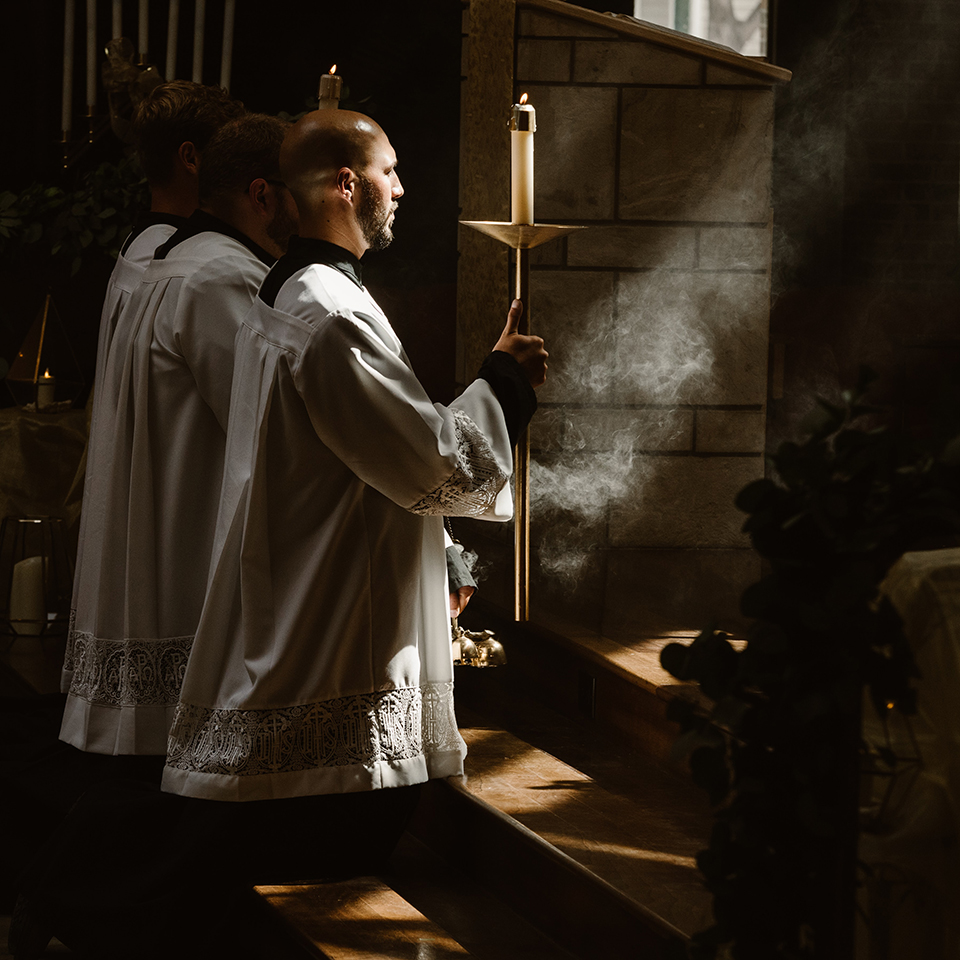At the end, we will find ourselves face to face with the infinite beauty of God, and be able to read with admiration and happiness the mystery of the universe, which with us will share in unending plenitude. Even now we are journeying towards the sabbath of eternity, the new Jerusalem, towards our common home in heaven. Jesus says: “I make all things new” (Rev. 21:5). Eternal life will be a shared experience of awe, in which each creature, resplendently transfigured, will take its rightful place and have something to give those poor men and women who will have been liberated once and for all.
—Pope Francis, Laudato Si’
No matter how many times I reconsider this Christian theological vision of the destiny of all creation, it takes my breath away. It is the destiny of the whole creation to pass-over into the new creation through the risen Body of Jesus, and it is in his Mystical Body—the Church—by which he has chosen to accomplish this Passover. As all creation awaited the “yes” of Mary to bear God’s Word, it awaits the “yes” of each one of us to come to glory in the sabbath of eternity.
When God became flesh in the womb of Mary, he joined not just human nature but the whole created order to himself. By his violent death, burial, and Resurrection, Jesus set all of creation free from the bonds of violence, death, and corruption, precisely by planting infinite mercy into the finite heart of fallen creation. At Pentecost, Jesus opened up this torrential mercy flowing from his risen Body to all of humanity, inviting each of us, through faith and Baptism, to freely cooperate with him in planting this limitless mercy into violence, death, and corruption.
And so making “all things new.”
This happens above all on Sunday, in the bread-wine-alms of the Eucharist offered, profound symbols of what priestly humanity has gathered in its six days of mercy-drenched secular work. In these symbols, the whole of creation is brought by us to God for a final consecration into the everlasting kingdom. It is in the celebration of the Eucharist that Jesus draws all things to himself, though-with-in us.
Yet . . . the accomplishment of all of this hinges on our daily “yes” to God, our feeble willingness to Ite, to go “with the grain of God” by living in harmony with his economy, his action, his will, his plan, his Christ, to save the world by consecrating it through our beautiful, faithful, truthful, hopeful, merciful, loving, kind, just, generous, peaceful, courageous, selfless, gentle, compassionate, pure, sacrificial, humble, surrendered lives. Through lives that manifest the full range of meaning compressed into these dense words of consecration: “For this is my Body which will be given up for you; the Chalice of my Blood, which will be poured out for you and for many.”
In those words is the whole meaning of consecration, which is our one life mission.
This Christ-like way of life, this path of divine-human synergy, is what we call liturgy. Liturgy is our entry point into the divine-human labors of the God-Man, the Master Carpenter who forever labors to join heaven and earth, justice and mercy, eternity and time, God and humanity, man and man, creation and Creator.
Pope Benedict XVI captured this awe-inspiring vision in his homily to the lay faithful of Aosta, Italy:
We ourselves, with our whole being, must be adoration and sacrifice, and by transforming our world, give it back to God. The role of the priesthood is to consecrate the world so that it may become a living host, a liturgy: so that the liturgy may not be something alongside the reality of the world, but that the world itself shall become a living host, a liturgy. This is also the great vision of Teilhard de Chardin: in the end we shall achieve a true cosmic liturgy, where the cosmos becomes a living host. And let us pray the Lord to help us become priests in this sense, to aid in the transformation of the world, in adoration of God, beginning with ourselves.
This is the mystical core of the “front lines” mission of the laity: to enter deep into the mortal wounds of our secular world and bring there Christ’s risen wounds, his consecratory words into every aspect of professional and civic life, culture, economics, politics, medicine, business, agriculture, ecology, technology, marriage and family, etc.
Inasmuch as we, who are the Body of Jesus, are able to enter daily into this deep heart of the world God so loves, and then bring its salvaged wreckage with us into the Offertory of the Mass to “offer it up” into the kingdom, “we shall find it once more, but cleansed of all dirt, lit up, and transformed, when Christ gives back to the Father an eternal and universal kingdom: a kingdom of truth and life, a kingdom of holiness and grace, a kingdom of justice, love, and peace” (Gaudium et Spes 39).
At the end of his life, ill and dying, St. Francis of Assisi told his fellow friars: “Let us begin, brothers, to serve the Lord God, for up until now we have done little or nothing.”
So let’s start again, now.
